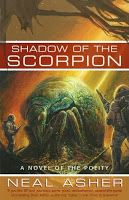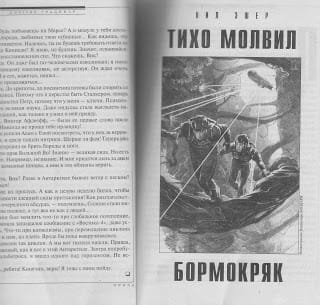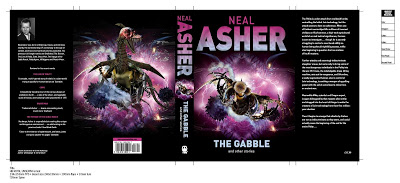Hey, guys, I didn’t think I would have much time to blog, but obviously the last entry refutes that idea. I’m presently working on Orbus, should be receiving edits for Scorpion Memory sometime soon, have put together the short story collection and recently had some other work hit me out of the blue. Over the last week I’ve been working on some ideas for a ‘Heavy Metal’ feature, but though I’d like to tell you more about that, I can’t. Really, if I told you I’d have to then post this special optic virus I’ve created. It loads through your eyes the moment you look at it and turns your brains into Ardennes pate, and sliced tomatoes.
Tag: Short Stories
The Gabble & Other Stories
Oh, and lest I forget. George Mann posting on here has reminded me that you can find two of my Mason’s Rats stories in the The Solaris Book of New Science Fiction.
Writing News Update
Okay, that’s a wrap. Gardner Dozois has accepted a story for his New Space Opera II. It’s called Shell Game, involves the Polity and another new set of rather nasty aliens. Other news: I’ve just sent off the short story collection to Macmillan. Some of you will have read some of the stories since they are ones that have appears in Asimov’s, Interzone and various ‘Year’s Best’ collections, but I guarantee none of you will have read them all. Here’s a list of the stories, which may be subject to change:
2. Putrefactors
3. Another England
4. Garp and Geronamid
5. The Sea of Death
6. Alien Archaeology
7. Acephalous Dreams
8. The Veteran
9. Snow in the Desert
10. Strood
11. Choudapt
12. Adaptogenic
13. The Gabble
At some point, when I can easily work out how to change an Adobe image to a jpg I’ll put up the cover here with its seriously weird gabbleduck picture.Addition: Here’s something I probably haven’t mentioned. You can go listen to one of these stories over here at Escape Pod!
Writing News Update
 Here’s a bit of an update on the writing and so forth: My Czech publishers – Polaris – have offered for rights of The Voyage of the Sable Keech. Publication will be within 12 months, licence limited to 4 years. Nightshade books are publishing Shadow of the Scorpion on May 1st this year. This is a book (longer than Prador Moon) covering some early episodes of Cormac’s life: Raised to adulthood during the end of the war between the human Polity and the vicious arthropoid race the Prador, Ian Cormac is haunted by childhood memories of a sinister scorpion-shaped war drone and the burden of losses he doesn’t remember. In the years following the war he signs up with Earth Central Security, and is sent out to help either restore or maintain order on worlds devastated by Prador bombardment. There he discovers that though the old enemy remains as murderous as ever, it is not anywhere near as perfidious or dangerous as some of his fellow humans, some closer to him than he would like. Amidst the ruins left by war-time genocides, he discovers in himself a cold capacity for violence, learns some horrible truths about his own past and, set upon a course of vengeance, tries to stay alive. As for writing done while in Crete: I completed the above mentioned book, a 10,000 word story for Gardner Dozois’s New Space Opera II and am more than a third of the way into Orbus, a follow-up to The Voyage of the Sable Keech: The Old Captain, Orbus – a sadist in charge of a crew of masochists – became a reformed character at the end of The Voyage of the Sable Keech and took over the captaincy of the spaceship the Gurnard. Meanwhile, the Prador Vrell, mutated by the Spatterjay virus into something powerful and dangerous, had seized control of a Prador dreadnought, killing its entire crew, and was heading back to the Prador Third Kingdom to exact vengeance on those who tried to have him killed. Both these characters are heading for ‘The Graveyard’ (mentioned in Alien Archaeology – Asimov’s) a buffer zone between the Polity and the Prador Kingdom, the perhaps into the kingdom itself. Orbus has a few unresolved issues about the Prador and about Vrell in particular …
Here’s a bit of an update on the writing and so forth: My Czech publishers – Polaris – have offered for rights of The Voyage of the Sable Keech. Publication will be within 12 months, licence limited to 4 years. Nightshade books are publishing Shadow of the Scorpion on May 1st this year. This is a book (longer than Prador Moon) covering some early episodes of Cormac’s life: Raised to adulthood during the end of the war between the human Polity and the vicious arthropoid race the Prador, Ian Cormac is haunted by childhood memories of a sinister scorpion-shaped war drone and the burden of losses he doesn’t remember. In the years following the war he signs up with Earth Central Security, and is sent out to help either restore or maintain order on worlds devastated by Prador bombardment. There he discovers that though the old enemy remains as murderous as ever, it is not anywhere near as perfidious or dangerous as some of his fellow humans, some closer to him than he would like. Amidst the ruins left by war-time genocides, he discovers in himself a cold capacity for violence, learns some horrible truths about his own past and, set upon a course of vengeance, tries to stay alive. As for writing done while in Crete: I completed the above mentioned book, a 10,000 word story for Gardner Dozois’s New Space Opera II and am more than a third of the way into Orbus, a follow-up to The Voyage of the Sable Keech: The Old Captain, Orbus – a sadist in charge of a crew of masochists – became a reformed character at the end of The Voyage of the Sable Keech and took over the captaincy of the spaceship the Gurnard. Meanwhile, the Prador Vrell, mutated by the Spatterjay virus into something powerful and dangerous, had seized control of a Prador dreadnought, killing its entire crew, and was heading back to the Prador Third Kingdom to exact vengeance on those who tried to have him killed. Both these characters are heading for ‘The Graveyard’ (mentioned in Alien Archaeology – Asimov’s) a buffer zone between the Polity and the Prador Kingdom, the perhaps into the kingdom itself. Orbus has a few unresolved issues about the Prador and about Vrell in particular …
Escape Pod.
Hey, check out Escape Pod and listen to Steve Ely reading my short story The Veteran. http://escapepod.org/2007/08/09/ep118-the-veteran/ Seated on a bollard, the man contemplatively removed his pipe, as if to tamp it down or relight it. Instead, he placed it stem down in the top pocket of his shirt, then reached up and pressed his fingers against his cheekbone and forehead. His face came away from his hairline, round behind his ears, down to a point just above his Adam’s apple. The inside of his mouth and much of his sinus were also part of the prosthesis, so only bare eyeballs in the upper jut of his skull remained – the rest being the black spikes and plates of bio-interfaces.Very enjoyable — they were suderdiles not superdiles, but I’ve no problem with that!
Article 5: Getting There.
Here’s an old one. I don’t recollect precisely when I wrote it, but certainly it was prior to 1999 when Macmillan took me on and prior to ’98 when I first started really using the Internet. It’s interesting to see my attitude of the time…
Getting There.
The first time novelist or short story writer is up a certain well known creek without even a canoe. If you’re a politician, a film star, or a model (you don’t even have to be able to write), the big publishers will provide you with a nice fat cheque and a power boat. The catch for a new author is that they might publish you if you’re known and as a new author you’ll only get known if they’ll publish you. It is also a sad fact that the likes of Harper and Collins receive two to three hundred manuscripts a week out of which they might publish two or three a year. Many large publishers freely admit that they will not even look at work unless it is submitted through an agent. It would also seem that these publishers are now run primarily by accountants and financial directors. Editors wanting to take on something new have to present this work to these people to justify the expenditure. As such justifications usually begin with, “Well this is like … ” the chance of anything groundbreaking being taken is minimal. The fact, I think, that all writers should be aware of is that these large publishers are not out to make books; they’re out to make money. So what other options are there? There are, thankfully, the small presses, and through them a gradual struggle up the ladder in the hope that you’ll reach a point where you can no longer be ignored. Small press publications range from illiterate productions of stapled-together A4 sheets to some magazines indistinguishable from what you’ll find on the newsagent’s shelf. There are presses that produce paperback books of a quality that exceeds that of the mainstream publishers (How often have you had one of these mainstream paperbacks fall apart in your hands as you read it? How often has the cover picture and blurb born no relation to the contents?) It is worth noting exactly what ‘small’ means in the latter cases. It usually only refers to circulation, editor’s bank balance, and advertising. They are not necessarily small on enthusiasm or professionalism. Don’t be fooled into thinking that you can get any old crap published here, but also be aware that if you are good, you stand a better chance here than with one of the lumbering giants that has a stranglehold on the the newstands and bookshops. Unfortunately the SF F and H (magazine) small presses are pretty much a closed circuit and it is quite possible for you to be very well known in them but not known outside. Very often the magazines published have a circulation that can only be numbered in the hundreds and not very many of them. The closed circuit is due to a large proportion of their readership being writers and by the mags only advertising in each other, (no doubt due to cost). What are you after though? If it is money then forget it. Payment ranges from a free copy of the mag your story is in to, if you’re really lucky, ten or twenty quid. The most I have achieved for short story publication was £60 from a magazine called Scheherazade and that was for ten thousand words divided over two copies. If it’s an audience you’re after then the most you can hope for is that for ten or fifteen minutes you will have the undivided attention of each of those hundreds of readers. Better than nothing. A problem you’ll face, writing for these small circulation magazines, is their proliferation and their swift demise. I have frequently had stories accepted by magazines that have then folded before publication of said story. There is no fault here in the enthusiasm or even financial acumen of the editors. It is just that a circulation of any more than a few hundred seems a tough barrier to break. Some have managed to, but for every one that does it seems that twenty others go to the wall. That barrier I think is ultimately heart-breaking for many editors. Another problem can be the lengths of time involved. In some cases you will not recieve a reply for a few months, thereafter, if your work is accepted, it can be months and even years before you see your work in print, and see any cheque that might be involved. This is because small press editors have to work for a living and that job ain’t in publishing. They have piles of stories to read through and reject before they find your gem. And often they might only bring out their magazines quarterly or even yearly. You’ll often notice when looking at these magazines that they’ll have an issue number, but that the editor has not been brave enough to put on a date. In one case I had to wait three years from acceptance of one of my stories until publication. But let’s face it, if you’re a writer, you should be thinking about your next story on the way back from the post box. Why write for the small presses if your ultimate aim is big time publication? To begin with the small presses are a superb training ground for the wannabes. Very often the editors of these magazines will take time to offer some criticism of your work (remember, if that criticism is ‘this is drivel’ that’s more than you’ll get elsewhere). You’ll also get a fair amount of feedback in the letters pages and even in other magazines. In this sense the closed circuit will work for you; many of these magazines have review columns and as well as reviewing films, and large circulation books and magazines, they review each other. Also, because of that proportion of writers in the readership, you’ll know that if you do get published it is not because of a lack of submissions to the magazine. The small presses are essentially a proving ground for the wannabe. To break into the small press market you do have to buy magazines. Some magazines will only publish stories written by subscribers; a form of nepotism brought on by a desperation to get subscribers. Once you’ve bought a few magazines you’ll have a feel for them and from adverts in them you’ll find other mags to which you may send your scribblings. Each time you send something off (with an SAE and covering letter) you’ll quite probably get fliers from yet more magazines with your rejection or acceptance. It is quite easy to build up one hell of a list of possible markets. If you want to increase that list then get hold of publications like Zene, Light’s List, or Dragon’s breath. In the fifteen years I’ve been writing for the small presses I’ve felt no need to submit work outside the UK, but then I’m not someone who produces a story a day. Once you’ve broken into the small press market (meaning that you have proven your worth to yourself, not that you have learnt the funny handshake) it’s worth looking at the small press book publishers in the hope of having something longer published. As you do these things take note of your achievements and utilise what leverage they might give to get you higher up the writing ladder. Unfortunately though you’ll find that small press book publishers face similar difficulties to those of the magazine publishers. So far I’ve seen three of them get into difficulties.Club 199, a publisher aiming to produce cheap paperbacks (£1.99, hence the name) had the printing side of things organised but not the advertising side. New Guild, whom I was under contract with, made the same mistake. Tanjen, has recently ceased taking on any new work. Sadly, these small publishers are up against the huge advertising machines of the large publishers, the clout they have with the likes of W H Smiths and Waterstones, and the spreading of costs over huge print runs. For me my writing has been a gradual struggle up that ladder, the small presses being the first few rungs. Too often we hear of someone getting the x-thousands advance on their first book and hearing this lose sight of the fact that they are the exception. There is a lot of truth in the image of the writer struggling away in his garret then drinking himself to death. The reality is that writing is hard, getting published is hard, and that if you want easy money your best option is to become an estate agent. It took me five or more years to get my first short story accepted and then that magazine folded before publication of my work. After that slight boost (and it was a boost; someone had actually wanted my work) I got more and more stories published, the occasional novella serialised, and a one-off novella published for a single cash payment. For my short stories my reward was a copy of the magazine and some complimentary letters (mostly). After another five years I was getting the occasional cheque – about enough to pay for a toner cartridge a year – then in the following five years finally gained some notoriety through the publisher’s Tanjen, with the production of another novella (The Parasite) then a short story collection (The Engineer).
My story, I warn you, has been one of relative success.
Article 3: Cities in Flight.
CITIES IN FLIGHT. There seems a belief, ascribed to by many of those writing short science fiction today, that nothing of importance happens unless it is set in the ‘mean streets’ of some city. On the whole the works stemming from this will be based on some student or other urbanite living a squalid existence in a seedy flat, while experiencing either relationship problems, or angst about an inability to have a relationship at all. Often, the writers are displaying a lack of imagination by casting themselves in the lead role in the only setting they have experienced. From the other side, there are many writers of fantasy who cannot step away from the image of their characters questing through the wilderness or some agrarian idyll, though that usually stems only from the secondhand experience gained throught the books they have read. Getting back to the cities though: are the writers of much urban science fiction nowadays suffering from the same delusion as the fantasy writers? Cities and the country bleed into each other. There are towns, villages, single houses and an infinite combination of everything inbetween; industrial sites in the country; city parks; wastelands being reclaimed by nature; connecting rivers and transport systems; and, fuckit, urban foxes. And of course in both directions there is a continuous exchange of people: wide varieties of commuters and ‘overspill’ and many so-called ‘country’ people moving into the cities to work. The dividing line, unfortunately, is near illusory, perceived mainly by resentful minds. Cities no longer have impenetrable walls around them with gates that are closed up at night and the countryside is no longer filled with Barny Hayseed clones chewing on straws and muttering about ‘tham thar towny buggers’. This perception displays the same blinkered vision as the present urban government, which legislates for cities and against the country – damaging those millions dwelling in between and polarising the attitude of many others – or of those dwellers in a time warp, the fox hunting lobby, who manage to piss off all camps. Britons live in a huge and wonderful variety of environments. Along our coasts there are many people who have tried to opt out by living in their boats, others divide their lives between boats and often much neglected coastal houses, there are huge transitory populations on the sea on oil rigs and in container ships, many millions inhabit suburbs, large populations live in villages where their only real connection with the countryside is that they notice it from their car whilst caught behind a tractor on their weekly visit to Asda, there are inclusive island populations who don’t even think about any division between city and country, there are towns where the countryside is only a step away and in which the residents truly live their lives in both. Of course, everything I’ve just written is also blinkered, for I’m describing Britain today. Maybe, an SF writer should be thinking of tomorrow’s Britain or an alternate one, or both. Also, Britain contains only a small fraction of the world’s population – there are actually other countries, and some very different ways of life. As for our urban environments? Even now the computer revolution is beginning to decentralise white collar professions, so what need to live in the city? Robotic manufacture is whittling down the required work force so what future need of industrialised towns? And the financial imperatives that originally made urban dwelling a necessity, will they last? Umph! Still today, still parochial! What about undersea dwellings, orbital communities, nomadic populations, cave dwelling morlocks, people adapted to live under the sea, people loading their minds into VR, even nomadic minds leaping from artificial body to body? Ach, I could go on and on, but the point is made: urban SF writers, lift up your heads, take a look around and try to imagine yourself somewhere else. Oscar Wilde quipped about how he may be lying in the gutter, but he’s looking at the stars, some people, it would seem, are lying face-down in that same gutter.
Cyrillic Gabbleduck.
 Here’s the cover of the Russian magazine containing Softly Spoke the Gabbleduck. I can’t remember the name of the mag. Anyone fancy leaping in with translation services again?
Here’s the cover of the Russian magazine containing Softly Spoke the Gabbleduck. I can’t remember the name of the mag. Anyone fancy leaping in with translation services again?
Ivan Yakubovich has stepped forwards (comments) to tell me the magazine is simply ‘If’ and is one of the country’s better known and oldest periodicals. Of course I’d been told all this by the editors, but couldn’t find the emails – I really must organize my mails better. Thanks Ivan!

This picture is the one that goes with the story, and is pretty much right too.
